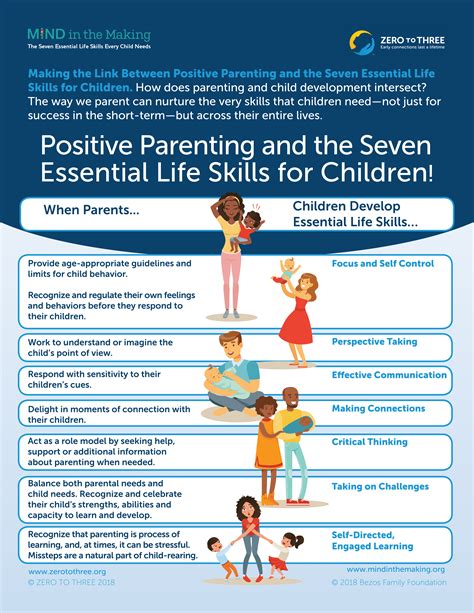Introduction
In the rapidly evolving world of 2025, nurturing skills have become paramount to foster healthy and well-rounded children. As parents, educators, and caregivers, it is our responsibility to provide a supportive environment where children can thrive emotionally, socially, and intellectually. This comprehensive guide will explore the significance of nurturing skills for children and equip you with practical strategies to enhance their development.

The Importance of Nurturing Skills for Children
Nurturing skills are essential for children’s well-being and overall development. Research conducted by the American Academy of Pediatrics suggests that children who receive adequate nurturing from their caregivers exhibit:
- Improved emotional regulation: Nurturing skills help children develop self-control, cope with stress, and express their emotions appropriately.
- Enhanced social competence: Children who are nurtured learn how to interact with others, build relationships, and resolve conflicts peacefully.
- Increased academic success: Studies have shown that children who receive nurturing support are more likely to have higher academic achievement and less likely to engage in risky behaviors.
Nurturing Skills VS Non-Nurturing Skills
To better understand the importance of nurturing skills, it is helpful to contrast them with non-nurturing skills. While all parents may want what is best for their children, non-nurturing behaviors can hinder their development.
| Nurturing Skills | Non-Nurturing Skills |
|---|---|
| Providing emotional support | Ignoring emotional needs |
| Encouraging positive behavior | Punishing excessively |
| Setting clear boundaries | Setting unrealistic expectations |
| Spending quality time together | Neglecting or ignoring the child |
| Listening attentively | Interrupting or dismissing the child |
Practical Strategies to Enhance Nurturing Skills
Nurturing skills can be learned and improved through conscious effort. Here are some practical strategies to enhance your nurturing skills:
- Active Listening: Pay undivided attention to what your child has to say, both verbally and non-verbally. Avoid interrupting or dismissing their feelings.
- Positive Reinforcement: Reward your child for positive behaviors, such as kindness, cooperation, and effort. This encourages them to repeat these actions.
- Boundary Setting: Establish clear and age-appropriate boundaries for your child’s behavior. Explain the rationale behind the rules and enforce them consistently.
- Quality Time: Make a conscious effort to spend quality time with your child each day. Engage in activities they enjoy and genuinely connect with them.
- Emotional Support: Offer emotional support to your child when they are feeling happy, sad, or anxious. Validate their emotions and help them develop coping mechanisms.
Common Mistakes to Avoid
While seeking to nurture your child, it is important to avoid certain mistakes that can undermine their development:
- Excessive Praise: While it is important to acknowledge your child’s accomplishments, excessive praise can lead to overconfidence and a lack of motivation.
- Overprotection: While it is natural to want to protect your child, overprotecting them can hinder their independence and ability to learn from their mistakes.
- Inconsistent Discipline: Children need clear and consistent boundaries to thrive. Inconsistent discipline can create confusion and undermine their trust in you.
- Comparison to Others: Avoid comparing your child to others, as this can damage their self-esteem and create feelings of inadequacy.
Benefits and Risks of Nurturing Skills
Like any parenting approach, nurturing skills have both benefits and risks.
| Benefits | Risks |
|---|---|
| Stronger parent-child bond | Potential overdependence |
| Increased child self-esteem | Difficulty with discipline |
| Improved emotional regulation | Potential for manipulation |
| Enhanced social skills | Risk of spoiling |
How to Future-Proof Your Nurturing Skills
As the world evolves, it is important to future-proof your nurturing skills to meet the changing needs of children. Consider the following strategies:
- Stay Informed: Keep up-to-date on research and best practices in child development and education.
- Seek Support: Don’t hesitate to seek support from other parents, teachers, or professionals if you encounter challenges in nurturing your child.
- Be Adaptable: Adjust your parenting approach as your child grows and develops. What works for a toddler may not work for an adolescent.
- Embrace Technology: Use technology as a tool to enhance nurturing, such as video calls with family members or educational apps that promote emotional development.
Reviews
Here are some reviews from parents who have successfully implemented nurturing skills in their parenting:
- “Nurturing skills have transformed my relationship with my child. I feel more connected to them and they seem happier and more well-adjusted.” – Sarah, mother of two.
- “As a single father, I initially struggled with nurturing, but these strategies have given me the confidence to create a loving and supportive environment for my son.” – John, father of a 5-year-old.
- “Nurturing skills have helped my daughter develop a strong sense of self-worth and empathy towards others.” – Emily, mother of an 8-year-old.
- “I wish I had known about nurturing skills sooner. They have made a world of difference in my parenting journey.” – David, father of a 12-year-old.
Conclusion
Nurturing skills are an essential aspect of raising happy, healthy, and well-rounded children. By employing the strategies outlined in this guide, you can enhance your nurturing skills and foster a strong and fulfilling relationship with your child. Remember that nurturing is a journey, not a destination, and there will always be opportunities for improvement. Embrace the challenges and rewards of parenting with confidence, knowing that you are providing your child with the foundation they need to thrive in the ever-changing world of 2025 and beyond.





















